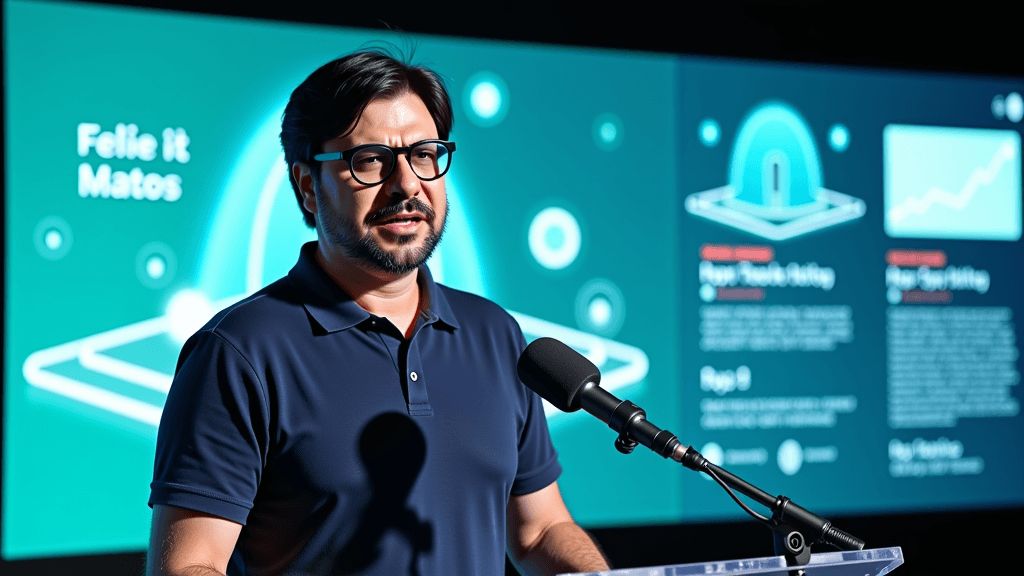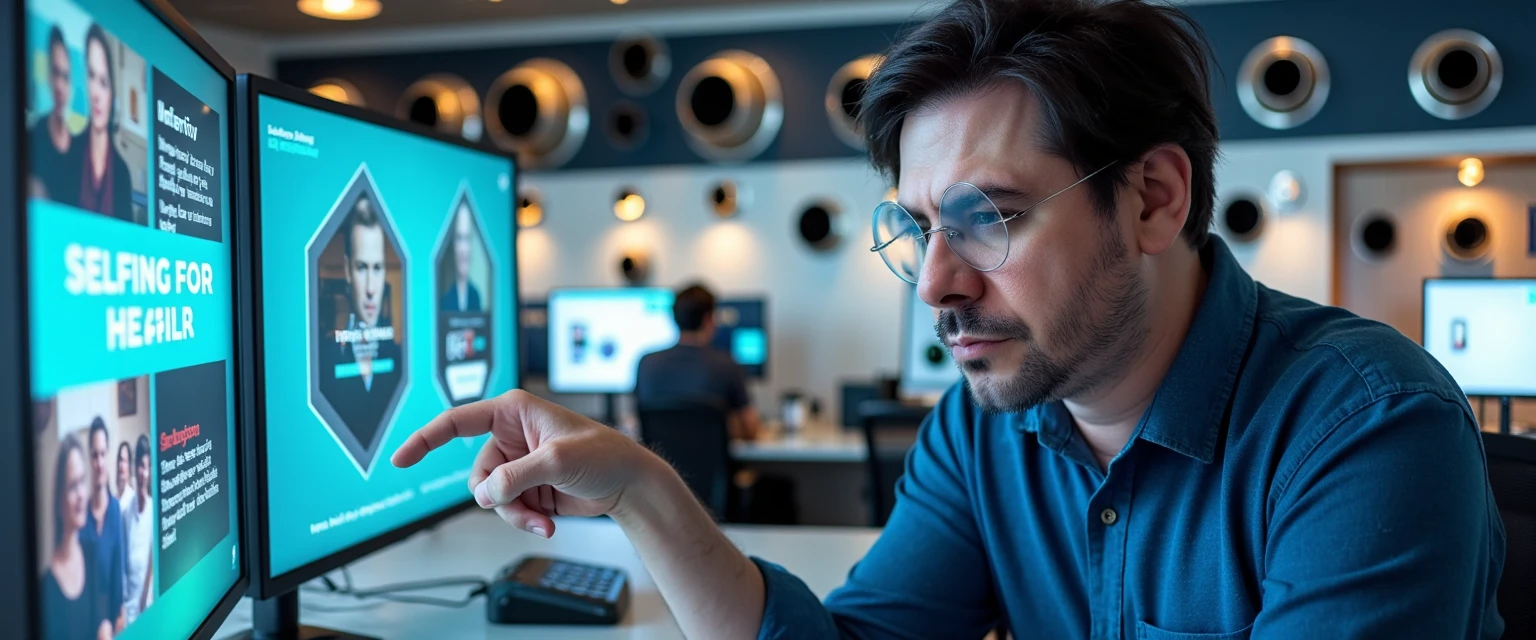Bill Gates’ Warning: AI Will Replace Doctors and Teachers in 10 Years – What Does This Mean for Brazil?
March 28, 2025 | by Matos AI

The artificial intelligence race is in full swing, and news from the last 24 hours reveals a clear acceleration in both forecasts and practical investments in infrastructure. Of note is Bill Gates’ warning about the replacement of professionals in areas traditionally considered “automation-proof,” such as medicine and education. At the same time, Brazil is beginning to take significant steps to position itself as a regional AI hub, despite facing significant structural challenges.
Bill Gates and the Future of Work: Who Will Survive the AI Era?
Bill Gates caused a stir when he stated that artificial intelligence will be able to replace doctors and teachers in the next decade. According to CNN Brazil, the former Microsoft CEO believes that AI-powered medical advice and tutoring will become commonplace and accessible within the next 10 years.
This does not mean the end of these professions, but rather a radical transformation in their functions. The mechanical, standardized and repetitive part will gradually be automated, while more human aspects, such as empathy, connection and contextualized critical thinking, will continue to be essential.
Join my WhatsApp groups! Daily updates with the most relevant news in the AI world and a vibrant community!
- AI for Business: focused on business and strategy.
- AI Builders: with a more technical and hands-on approach.
In another recent statement, Gates highlighted three areas that will remain largely human even with the advance of automation: health biosciences, alternative energies and, ironically, the development of artificial intelligence itself. His central argument is that creativity and the ability to formulate original scientific hypotheses cannot be completely replicated by machines.
This analysis by Gates reinforces what I have been arguing for years in my lectures on the future of work: we are entering an era where CACACA skills (Creativity and Autonomy; Collaboration and Adaptability; Connection and Affection) will be fundamental to human employability. The professions that will be transformed most quickly are precisely those based on protocols, clear rules and structured knowledge — even those that currently require high qualifications.
AI in education: revolution with impressive numbers
As we discuss the future of the teaching profession, we are already seeing concrete results from the application of AI in the educational environment. According to UNESCO report, adaptive learning systems and virtual assistants are significantly improving student performance, increasing motivation and reducing school dropout.
This reality reminds me of the work we do at Sirius, where I saw firsthand how active learning methods combined with technological tools can transform the way students absorb and apply knowledge. Personalized learning, something that human teachers can hardly offer to large classes, becomes possible with AI systems that identify gaps and suggest specific content for each student profile.
However, the teacher does not disappear—he or she transforms into a curator, mentor, and facilitator, focusing on the social-emotional skills and critical thinking that only humans can properly cultivate.
From a workless society to a universal income: the great dilemma
One of the most profound debates about the intensification of automation via AI is captured in an interesting reflection published by VEJA magazine: Are we heading towards a “hell without work” or a “paradise with universal income”?
This is a question I have addressed frequently in my lectures on the future of work. Technological advances are creating a historical bifurcation: we can have either a dystopian scenario of extreme income concentration and labor shortages, or a utopian scenario where automation frees up human beings for more meaningful activities while redistribution mechanisms ensure dignity for all.
The path we follow will depend less on technology itself and more on the political, economic and social choices we make in the coming years. It is not an automatic process, but a collective construction in which businesspeople, politicians, educators and citizens play a fundamental role.
Brazil: Infrastructure and Investments for Latin America’s AI Hub
Speaking of practical aspects, an important piece of news is that the first AI-specific data centers begin to be implemented in Southern Brazil, according to Folha de S.Paulo. Companies such as RT One and Scala Data Center are investing in infrastructure with high energy consumption to meet the growing demand for processing AI models.
These investments align with the forecast that Brazil will consolidate itself as an AI hub in Latin America, with investments of R$22 billion by 2028. Research by the Center for Management and Strategic Studies (CGEE) indicates the existence of 144 AI research units in the country, concentrated in the health, energy and agriculture sectors.
I follow this development with cautious optimism. In my mentoring work with startups and large companies, I see a growing interest in AI applications, but I also note that we are still far from the major global hubs in terms of investment, specialized talent and clear regulatory frameworks. The difference between being a “regional hub” and a “significant global player” lies precisely in these three pillars.
Socio-environmental challenges of AI infrastructure
A worrying aspect of the expansion of AI infrastructure is its environmental impact. According to Folha de S.Paulo, data centers under construction in Brazil face significant challenges related to energy distribution and intensive use of water for cooling.
This issue is especially relevant for Brazil, a country that has a potential competitive advantage in its relatively clean energy matrix. However, AI processing infrastructures are among the most energy-intensive in the digital world, and their accelerated growth could put pressure on our generation capacity.
The environmental dilemmas of AI illustrate what I have always argued: we need a holistic view of innovation, one that considers not only productivity gains but also its social and environmental impacts. In my experience with innovation ecosystems, the most sustainable projects in the long term are precisely those that balance these three pillars.
Innovations that Expand Access: The Case for AI for Inclusion
Among the news that most excited me in the last 24 hours is the JCDecaux initiative that uses AI for audio description of ads, making them accessible to people with visual impairments. The tests carried out on the São Paulo subway demonstrate how technology can be a force for inclusion when applied with purpose.
Similarly, A British study has revealed that AI can detect fetal anomalies almost twice as fast than conventional methods, with AI-powered ultrasounds being 42% faster and providing a better patient experience.
These applications illustrate a central point of my work with startups and innovation: cutting-edge technology does not have to be exclusionary or concentrative. When developed with a humanistic and inclusive vision, AI can democratize access to essential services and improve the quality of life of traditionally marginalized populations.
Regulation and protection of rights: the European way
Another fundamental dimension of AI evolution is regulatory. According to JOTA, the regulation of AI in Europe and its impact in Brazil aims to protect fundamental rights by establishing clear rules for the development and use of these technologies.
Although there are criticisms regarding the potential inhibition of innovation and competitiveness, the focus on protecting human beings and mitigating risks is essential at a time of accelerated adoption. With the promise of similar regulations in Brazil, the discussion about rights and responsibilities in the use of AI is intensifying.
In my experience as president of the Brazilian Startup Association and participating in several advocacy initiatives, I have always defended the importance of clear regulatory frameworks that do not stifle innovation. The balance is delicate, but essential to allow Brazil to develop in this field without repeating mistakes already observed in other countries.
Accessible Models: Democratizing AI Development
Finally, it is worth highlighting that Alibaba announced Qwen2.5-Omni-7B, an open-source multimodal AI model that aims to create low-cost intelligent agents. This type of initiative is crucial to democratize access to cutting-edge technology and allow companies of all sizes to develop and adapt it to specific needs.
Making models available openly is especially relevant for emerging ecosystems like the Brazilian one, where startups and mid-sized companies often lack the resources to train their own models. I firmly believe that the future of AI in Brazil depends on our ability to adapt existing models to solve specific local problems, creating value and differentiation.
What does this mean for Brazil? Opportunities and needs
Analyzing the full panorama of news from the last 24 hours, I see both opportunities and warnings for Brazil. On the one hand, we have the capacity to attract investment in infrastructure, academic expertise in key areas and a significant domestic market for testing applications.
On the other hand, we face structural challenges such as the training of talent at scale, inequality in access to basic digital technologies and the need for regulatory frameworks that balance innovation and rights protection.
In my mentoring work with startups and large companies, I have reinforced three fundamental axes to take advantage of this technological wave:
- Identifying local problems that can be solved with new AI capabilities;
- Development of hybrid skills that combine technical understanding and business vision;
- Building strategic partnerships that allow leveraging scarce resources.
The window of opportunity is open, but it will not remain so indefinitely. The next 3-5 years will be decisive in determining whether Brazil will be just a consumer or also a relevant producer of AI technologies.
Final considerations: navigating transformation
The news of the last 24 hours reinforces what I have been discussing for years in my lectures and consulting sessions: we are experiencing a radical transformation in the relationship between technology, work and society. Bill Gates' predictions about the replacement of qualified professionals, investments in infrastructure in Brazil and initiatives to democratize technology through open models are just different facets of this same accelerated phenomenon.
The future is not written. It will be defined by the choices we make today, both individually and collectively. In my mentoring sessions with companies and startups, I always emphasize that technology is a means, not an end. The true value lies in how it can be applied to solve real problems and improve people’s lives.
To navigate this complex landscape, companies, professionals and policymakers need a clear vision of both the technical aspects and the social implications of these technologies. It is precisely at this intersection that I have focused my work in recent years, sharing lessons learned from more than two decades of experience in the technology and innovation ecosystem.
Artificial intelligence is redefining what is possible. It is up to us to determine whether this redefinition will be inclusive, sustainable, and human-centered. And that is a challenge worth taking on.
✨Did you like it? You can sign up to receive 10K Digital's newsletters in your email, curated by me, with the best content about AI and business.
➡️ Join the 10K Community here
RELATED POSTS
View all



